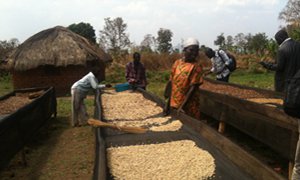Diversifying economic opportunities with coffee

South Sudan has a long coffee history, but its coffee industry was largely destroyed during the civil war. The opportunity to have a positive impact in South Sudan is significant. Coffee would provide much needed income and security for thousands of farmers and their families and has the potential to play an important role in helping to diversify the economic base in the country.
As announced in July 2013, Nespresso will invest in reviving the production of high quality South Sudanese coffee, in collaboration with the international nonprofit organisation TechnoServe. The company’s two-year upfront investment of about CHF 700’000 since 2011 has demonstrated the potential for commercial coffee production in the country.
The three first coffee cooperatives of South Sudan have been established, and their wet mills to process the coffee have been constructed in the Yei region. Central wet mills will play a key role in improving the quality of the coffee, as it reduces the impact of quality inconsistency on the cherries usually processed using the dry method. Thanks to this new processing method, Nespresso can buy high quality washed robusta, a new category of coffee in South Sudan, while at the same time taking advantage of the intrinsic quality of the local Robusta coffee plants that have survived the long war period. Central wet mills will also bring benefits to the farmers.
“Thanks to TechnoServe and Nespresso, which supported setting up a wet mill, it has given me, as a woman, less work – especially hulling. I was using a grinding stone or a mortar; but now, we are using the wet mill for processing,” said Hellena Atiku, a farmer from Inutu Cooperative, South Sudan.
Around 300 farmers have integrated the three newly created coffee cooperatives, which have received support to enable farmer mobilization, registration and quality processing, as well as trainings to form a well-designed and managed coffee cooperative.
Laying the foundation for the future
“In South Sudan, it’s been exciting to partner with rural communities and Nespresso to start the work of building a coffee industry that could provide a sustainable source of income for 50,000 families in the future,” said Paul Stewart, Regional Director Coffee Initiative at TechnoServe. “When I talk to farmers, they all share the dream of growing coffee along with their food crops to provide much needed cash to pay for school fees and other basic needs. But infrastructure to process and export the coffee is needed to make this a reality.”
As part of the expansion of the AAA Program in Africa, Nespresso will invest about CHF 2.5 million in the coming years in South Sudan.
"During the last decade, I traveled to South Sudan on a number of occasions in order to support the people's aspirations for peace after suffering through a devastating war that cost over two million lives,” said Nespresso brand ambassador George Clooney. “Now a new war has begun, and I strongly support the peace process to end it. But work must also be done now to prepare for peace, and that includes creating economic opportunities for the people of South Sudan and diversifying the economy of the country away from an exclusive reliance on oil. In that context, the investment by Nespresso and TechnoServe in South Sudan's coffee sector is providing much-needed income for thousands of farmers and their families living in coffee communities. The investment is also helping to lay a foundation for a future South Sudan built on peace and prosperity, where wealth is created and shared for the benefit of the people.”
The initial program aims to support 2,000 smallholder coffee farmers through a focus on improving yields and coffee quality through the establishment of central wet mills and by providing training, while developing commercial channels to enable the sale and export of South Sudanese coffee.
TechnoServe and Nespresso will leverage this initial two-year investment in South Sudan to attract additional funding from private and public donors, with the aim of scaling up the program from 2016 to 2020, reaching up to 8’000 farmers.
Nespresso has managed to source in 2014 about 10 tons of South Sudanese washed Robusta parchment coffee. In 2013, the company had already sourced about one ton of coffee.
